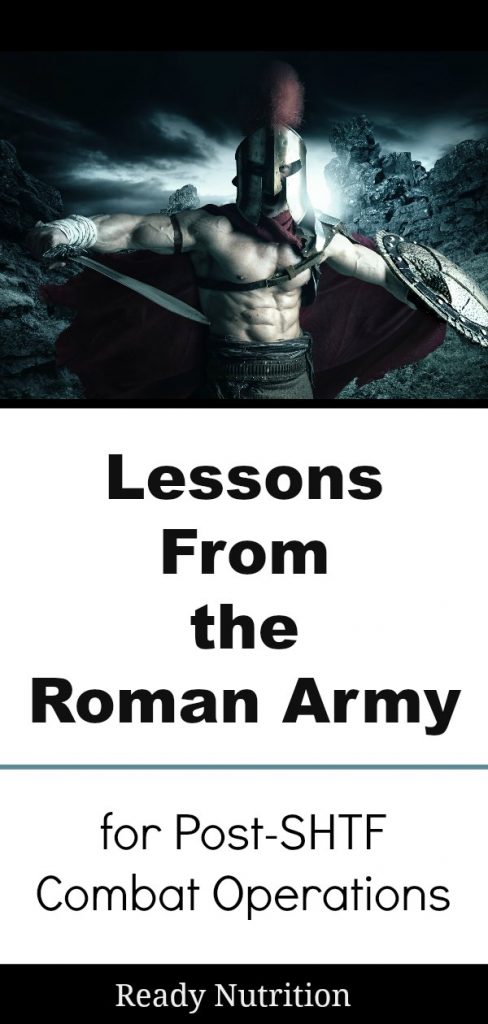
We’ve discussed “Fabian Tactics” in previous articles. These were based on the exploits of Quintus Fabius Maximus in the First Punic War between Carthage and Rome. “Hit and Run” tactics exemplify their description: strike a numerically superior larger force at a time and place of your choosing, and then break contact. Fade back into the forest, hide, and avoid further combat until the next engagement of your choice.
Lessons from the Roman Army for Post-SHTF Combat Operations
Let’s “fix” ‘em: set the enemy up and zap ‘em! Let’s do a few things that the Romans were famous for…using these techniques here and now.
- Choose the Ground: Yes, you choose the place you will engage them. Along with this, you pick the time of day, the formation of the attack, the objective, and the criteria for withdrawal. You choose it. As an individual, you would be sniping. As a group (depending on your numbers and composition), you can engage in operations limited by your size. Choosing the ground means also to actively recon the enemy and not allow him to choose it and catch you unawares.
- Prep the Ground: The Roman Army were masters of this task. They scouted the area and with thorough intel, they knew where their enemies were, actions these people planned on taking, and avenues of approach. They cut timber and created obstacles of logs interlaced with natural “barbed wire” in the form of thorns and thistles…along with spikes and stakes, to limit enemy cavalry. Long before William Wallace of “Braveheart” was ever a thought, the Roman legions spread out hay soaked with pitch and oil in areas where enemy foot soldiers would move, and applied flaming arrows when the time was right. They always took the high ground when possible, and used the natural terrain features (cliffs, rivers, etc.) to form boundaries to help them channel the enemy.
- Always Fight with the Sun at your Back: The Romans positioned themselves and attacked to place the sun in the eyes of their enemies. I know, I know: the enemy has “Ray-Bans,” right? No, it worked for the Viet Cong as well. When they’re looking into the sun, they’re at a severe disadvantage. Use the sun. Use the terrain. Live with the land and live.
- “SPECVLATORES”- the Speculatores…the deep-cover operatives…the Special Forces and Reconnaissance warriors of the Roman Empire. You need operatives in your “unit” with the ability to do “deep penetration” of an enemy’s defenses…whether in their midst unsuspectingly or observing them from a nearby locale…operating on their own ground unbeknownst to them. You need one or two people who can get the job done…and provide you with the deep-cover intel you’ll need to make decisions.
- Alliances – “The enemy of my enemy is my friend.” Not always so, but you can use such rifts to your advantage…with other groups who your enemy is at odds with. Here is where diplomacy, teamwork, and political acumen/savvy comes into play. These “non-combat” skills are just as important to “fixing” your enemy as any of the actual missions you will undertake to defeat him. Be skilled at making alliances, and do not make them just for the sake of socializing. It is an art that we will cover more in-depth in future pieces.
- Feed Them Disinformation: Yes, the Romans were very adept at sending messages or planting information that was false. This regarded their strengths, their movements, supplies, and reinforcements. Sun Tzu was not the only one with a knowledge of how to monopolize disinformation, and he wasn’t the first to employ it.
- Lure Them and “Stake” ‘Em – the Roman Army would plant different things out in front of an approaching enemy force in order to delay and distract them…making them ripe for an attack or ambush. You can do the same, and make it fall “in line” with the enemy you’ll be facing. Quick question: How many of you have Russian or Chinese canned delicacies, such as Borscht or caviar for the former, or imported Chinese canned foods and fineries for the latter? Because you may be able to use it to lure such if they ever come to this country…and set a trap on or in it, or place shooters in an overwatch position overlooking it. Because you may need prisoners, and what better way to lure them in than with a carton of their own cigarettes, their own liquor that they would think to be safe? Be advised: SAVE YOUR RECEIPTS FROM THE STORE YOU BOUGHT IT! This is because in the times to come if anyone ever suspects you of collaborating with them…you can show the receipts that you bought it all long before the conflict began, and give them an explanation of why you bought it all. This may keep you from being shot by your own countrymen.
- The Violence of Action in a Controlled Manner – the Romans did not win their mastery over all of Europe and most of the Middle East by conducting drill and ceremony. They were trained, skilled killers and understood that the thing that made the Empire possible was the discipline and aggression of the individual legionnaire.
- A Perfect Chain of Command – Modern militaries all have a chain of command and an order of succession for someone to fill the “vacancy” at all levels when a commander “buys the farm,” so to speak. You need to enable each member of your team to be able to step into the shoes and position of the leader and take charge to continue with the mission.
- Discipline: this encompasses all areas. A “guerrilla fighter,” whether fighting off marauders from a neighboring town post SHTF, or a tyrannical, oppressive government, or a foreign invader…the guerrilla needs to be disciplined. Physical toughness, adherence to standard operating procedures (SOP’s), a cool head and iron nerves, and endurance…the ability to keep this up for years…to go the distance. These are the things that the Romans kept focused upon and central to their legions for many centuries.
In conclusion, small unit tactics are more than just a matter of either superior arms or numerical advantages. They are based on common sense and knowing how to plan out your objectives, as well as a plan of attack. You will have to be the “David” going against the Goliath, and although not shirking from battle, picking the time and place of your engagement, and the conditions and standards you will set to achieve those objectives. It is no guarantee of success, but you are guaranteed to perform better with the proper planning, training, and clarity of purpose prior to a battle. It can mean the difference between success and failure, life or death. In this vein, I highly encourage you to study more about the Roman Army and the warfare in ancient times. Take the time to clean the tarnished pitcher and you may just find a silver piece made by Revere. The knowledge is there: seek after it and make your future rather than just allowing it to happen to you. That’s what it’s all about. JJ out!


One other thing that helped the Romans to win, was their engineering skill, from road and bridge construction to defeating fortifications built by the enemy.
Nice. Just don’t ever stand and fight. Geronimo and 18 warriors tied down 1/4 of the U.S. Army as well as a whole shit load of Federalies.
Remember this also. Hit the leader first. It always takes time to shift the command. That time makes for confusion. Never hit a superior force in the open. You can take them out when they get home faster and easier. Make the enemy split their forces. Cutting them down is easiest when they have to split and split again. Lead them to crossroads and make it impossible to discern which one. Hit their psyche. If you don’t want to knock them down, mess with their mind. Hit something or break something they love. Its dirty but its effective.
Ambush, Ambush and Ambush!
Post war analysis snowed that the Vietnamese were most often choosing the time and place of engagement.
Sun Tzu taught them well. Gettysburg was lost because Lee persisted in a battle that had no objective and ground disadvantage.